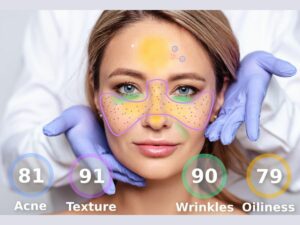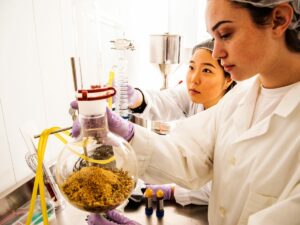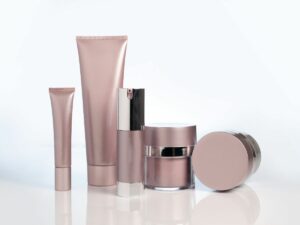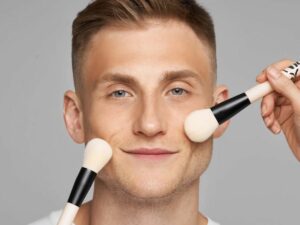Did you know that technology and digitalization are rapidly reshaping how consumers interact with beauty products? That’s right, the cosmetic industry trend is leaning heavily into the digital field.
Having spent years immersed in the cosmetic world, our expertise ensures you get accurate and forward-thinking insights.
Here are just a couple of exciting innovations you can expect to dominate:
- AI and Augmented Reality in Beauty Shopping
- Digital Skincare Analysis Tools
In this guide we will delve deeper into these transformative trends that are not only revolutionizing customer experiences but also opening new avenues for skincare brands, salons, and spas.
Keep reading to equip your brand with the knowledge that will set you apart in 2024.
1. AI and Augmented Reality in Beauty Shopping
In today’s digital era, AI and Augmented Reality are revolutionizing the beauty shopping landscape, offering consumers interactive and highly personalized experiences. Here are 3 facets of this transformative trend:
Virtual Product Try-Ons
The brick-and-mortar shopping experience has always provided the advantage of product trials. However, AI and AR have bridged this gap for online shoppers. Virtual product try-ons allow users to visualize how a cosmetic product—be it a shade of lipstick or a tint of foundation—looks on them, in real-time, from the comfort of their homes.
Tailored Shopping Journeys
With AI’s data processing capabilities, beauty shopping is becoming less about browsing and more about personalized discovery. AI algorithms analyze users’ past purchases, browsed products, and even skin types to curate a list of product suggestions tailored for the individual.
This means a consumer is now presented with products that are more in line with their preferences and beauty needs, enhancing the overall shopping experience and increasing brand loyalty.
Augmented Reality Tutorials
Beyond product try-ons, Augmented Reality offers educational value through interactive makeup tutorials. Users can follow along with an AR-guided makeup application that shows step-by-step instructions directly on their reflection. It not only educates consumers about product application but also showcases the product’s potential, driving more informed and satisfied purchases.

2. Digital Skincare Analysis Tools
The journey to perfect skin is no longer a game of guesswork. With the advent of digital skincare analysis tools, consumers can now receive bespoke skincare advice. Here are three ways these tools are making waves:

Personalized Skincare Routines
Gone are the days of one-size-fits-all skincare routines. Digital tools can now analyze specific skin concerns, from dryness to hyperpigmentation. By evaluating user-uploaded selfies or answering a series of questions, these tools provide tailored skincare routines, ensuring that users receive product recommendations precisely suited to their skin type and concerns.
Skin Progress Tracking
Consistency plays a pivotal role in achieving optimal skincare results in the cosmetic market, and digital advancements are stepping in to bolster this principle. With the aid of these tools, users can periodically assess their skin, drawing comparisons over time to pinpoint improvements or alterations. Nako Cosmetics recognizes the potential of these digital innovations within the cosmetic market, aligning its offerings to empower its users to make enlightened skincare choices.

Product Efficacy Feedback
Brands can benefit immensely from these digital tools by receiving direct feedback on product efficacy. Users can report their experiences, allowing brands to gather real-world data on how their products work over time. This feedback loop not only builds trust with consumers but also provides valuable insights for future product development.
3. Plant-Based Ingredients
The cosmetic industry is witnessing a green revolution as plant-based ingredients become a focal point for consumers and brands alike. Here are three distinct ways this trend is reshaping the beauty landscape:

Ethical Consumerism
As consumers become more environmentally conscious, there’s a heightened demand for products that align with these values. Plant-based ingredients resonate with this audience as they often represent sustainable and cruelty-free alternatives. The shift isn’t merely about the ingredients themselves but the message they convey: a brand’s commitment to eco-friendly practices and ethical product formulations.
Enhanced Skin Benefits
Plant-derived ingredients, rich in antioxidants, vitamins, and minerals, often offer unique skin benefits. Ingredients like hyaluronic acid from plants, squalane derived from olives, and peptides from plant proteins are revolutionizing skincare products. Their natural origin means they’re often gentler on the skin, reducing the likelihood of adverse reactions and catering to a broader audience, including those with sensitive skin.

Holistic Beauty Approaches
The rise of plant-based ingredients intersects with the broader trend of holistic health and beauty. For instance, consumers are increasingly viewing skincare and beauty as an extension of their overall wellness. According to Univar Solutions, brands leveraging plant-based ingredients are often seen as promoting a more holistic beauty routine, integrating the benefits of nature with the rituals of skincare.
4. Premiumization
Premiumization, the act of adding value to products through unique experiences or superior quality, is becoming mainstream. Here are three ways this trend is elevating the cosmetic industry:
Experiential Retailing
Premiumization is transforming brick-and-mortar stores into beauty havens. These are not mere shops but immersive spaces where customers can enjoy personalized consultations, spa-like treatments, and hands-on workshops. Such experiences make shopping more engaging, creating a sense of exclusivity and luxury, irrespective of the product’s price point.

Ingredient Innovation
Premium products are often characterized by their unique formulations, incorporating rare ingredients or cutting-edge technology. Brands are investing in research to source exotic ingredients, such as gold-infused serums or truffle-infused moisturizers, promising consumers superior skincare benefits and a touch of opulence.

Elevated Packaging Design
First impressions matter, and in the world of cosmetics, packaging plays a pivotal role. Premiumization has seen brands opt for sustainable yet luxurious packaging – think glass jars, wooden caps, and intricate designs. Such packaging not only appeals aesthetically but also signifies a product’s quality and the brand’s commitment to excellence.

5. Wellness Integration
The boundaries between beauty and wellness have begun to blur, leading to a holistic approach to self-care. Here are three specific facets of this integration:
Beauty Supplements and Nutricosmetics
Traditional skincare isn’t just about topical applications anymore. The rise of beauty supplements and nutricosmetics signifies the belief that beauty starts from within. Brands are launching capsules, powders, and drinks enriched with vitamins, minerals, and other nutrients that promise glowing skin, healthier hair, and stronger nails.

Mindful Beauty Rituals
The concept of mindfulness, typically associated with mental wellness, has found its way into beauty routines. Brands and influencers alike are promoting beauty rituals as moments of self-reflection and relaxation. Products like essential oil-infused serums or crystal facial rollers not only cater to skin health but also offer a therapeutic, spa-like experience, making skincare a meditative practice.

Fitness and Skincare Synergy
With the understanding that fitness plays a crucial role in skin health, there’s a surge in products designed for the active consumer. Face mists, sweat-resistant sunscreens, and muscle-relaxing body oils are just a few innovations that cater to those who integrate fitness into their daily lives. These products underscore the idea that a holistic approach to wellness encompasses both physical activity and dedicated skincare.

6. Men’s Beauty Products
No longer sidelined, the men’s grooming and beauty sector is booming with diverse products tailored to their unique needs. Here’s a deep dive into three trends driving this growth:
Beyond Basics Grooming
While earlier men’s beauty primarily focused on basics like shaving creams and deodorants, the narrative is changing. Serums, eye creams, and even sheet masks formulated specifically for men’s skin are entering the market. Brands recognize that men too desire comprehensive skincare routines and are creating products that cater to their specific skin concerns, from reducing fine lines to tackling rough skin texture.

Embracing Makeup
Challenging traditional gender norms, makeup for men is no longer taboo, according to The Daily Beast. Whether it’s subtle concealers to camouflage blemishes or bolder products like eyeliners and lip tints, brands are introducing makeup lines designed for men. This shift not only caters to the aesthetic desires of men but also signals a broader cultural acceptance of fluid beauty standards.

Haircare Renaissance
Men’s haircare is undergoing a transformative evolution. Beyond the conventional realm of shampoos and gels, the landscape now embraces specialized solutions like scalp treatments and conditioners tailored for beard nourishment.
Addressing diverse concerns, from thinning hair to graying strands, Nako Cosmetics is at the forefront of this revolution. Their product line underscores the importance of a comprehensive haircare regimen for men, striking a balance between aesthetic appeal and optimal scalp health.
7. Digital Marketing and Influencers
In an age where digital realms dominate consumer interaction, the cosmetic industry is no exception to its influence. Here’s an exploration of three pivotal elements:

The Rise of Micro-Influencers
While celebrities and top-tier influencers have significant followings, there’s a growing interest in partnering with micro-influencers. Their endorsements appear genuine and relatable, leading to a more potent impact on purchasing decisions. Brands are recognizing this potential and are keenly collaborating with micro-influencers to tap into niche communities and ensure authentic product promotions.
Interactive Content and Live Streaming
Beyond traditional posts and stories, brands are leveraging interactive content to engage their audience. Polls, quizzes, and AR try-ons have become standard on platforms like Instagram and Snapchat. Brands and influencers host live sessions where they demonstrate products, hold Q&A sessions, and even collaborate with viewers in real-time, fostering a sense of community and immediacy.

Transparency and Authenticity
Today’s consumers are discerning and value transparency. Digital marketing campaigns are moving away from overtly airbrushed and unrealistic portrayals. Instead, brands are showcasing real people, real results, and behind-the-scenes looks into product formulation and company ethics. This trend of authenticity resonates with audiences who seek trustworthy brands and products.
8. Inclusivity and Diversity
As beauty ideals evolve, the industry is responding with products and campaigns that celebrate all skin tones, genders, and ages. Here’s a closer look at three facets of this inclusive movement:
Expansive Shade Ranges
Brands are releasing foundations, concealers, and other complexion products in an extensive array of shades, ensuring that everyone, regardless of their skin tone, finds a perfect match. This shift isn’t just about numbers; it’s about providing undertones and formulas that genuinely cater to diverse skin tones, ensuring optimal product performance for all.

Gender-Fluid Beauty Products
The binary concept of male and female products is fading, making way for gender-fluid beauty. Brands are introducing lines that aren’t targeted at a specific gender but are instead designed for everyone. The focus is on product efficacy, texture, and results, rather than gendered marketing, resonating with a consumer base that prioritizes performance over labels.

Representational Marketing Campaigns
No longer are beauty campaigns limited to a narrow representation of beauty. Brands are embracing models of all ages, body types, skin tones, and genders. By showcasing the beauty in diversity, they are sending a potent message of acceptance and are building deeper, more meaningful connections with a broader audience base.
9. 3D Printing in Cosmetic Product Development
The technological revolution in the cosmetic industry is nowhere more evident than in the adoption of 3D printing. Delve into three key ways 3D printing is transforming cosmetics:

Customized Beauty Solutions
3D printing allows brands to craft bespoke products tailored to individual needs. Whether it’s creating a lipstick in a specific shade chosen by a consumer or designing facial masks that fit an individual’s unique facial contours perfectly, 3D printing offers unparalleled personalization. This high level of customization enhances user experience, ensuring that products cater precisely to individual preferences and requirements.
Rapid Prototyping and Testing
Before a product hits the market, it undergoes multiple iterations and testing phases. 3D printing accelerates this process. For example, brands can swiftly prototype packaging designs, applicators, or even the product’s texture, facilitating quicker feedback loops and more efficient product development. This agility allows brands to respond faster to market trends, ensuring they remain at the forefront of consumer demands.
Sustainable Production Processes
Sustainability is a significant concern in today’s cosmetic landscape. 3D printing offers a potential solution. By producing items on-demand, brands can significantly reduce waste associated with overproduction. Moreover, as 3D printing technology advances, there’s growing potential to use eco-friendly materials in production, further cementing this technology’s role in creating a greener cosmetic industry.
10. Biotech Innovations with a Focus on Sustainability
As sustainability becomes a non-negotiable aspect of consumer expectations, biotech offers promising avenues. Explore three integral ways biotech is steering the industry towards a sustainable future:
Lab-Grown Ingredients
Harvesting natural ingredients can sometimes be resource-intensive and detrimental to ecosystems. Biotech provides an alternative: lab-grown ingredients. Through cellular agriculture and microbial fermentation, ingredients can be produced in labs. This not only ensures a consistent quality but also reduces the environmental footprint associated with traditional harvesting methods.
| Aspect |
Description |
Example/Implication |
| Production Method |
Biotech methods used to produce lab-grown ingredients. |
Cellular agriculture and microbial fermentation. |
| Environmental Impact |
Comparison of lab-grown ingredients to traditional harvesting in terms of environmental footprint. |
Lab-grown ingredients reduce the strain on ecosystems and are less resource-intensive than traditional harvesting. |
| Quality Consistency |
Benefits of producing ingredients in a controlled lab environment. |
Lab environments ensure consistent quality, free from external contaminants and variables that can affect ingredient quality in natural settings. |
| Economic Implications |
Potential cost benefits or challenges associated with lab-grown production. |
While initial setup might be expensive, long-term production can lead to cost savings due to reduced dependency on natural resources and external factors. |
Enhanced Product Efficacy
Biotechnology allows for a deep understanding of skin biology at a molecular level. Brands can develop products that interact optimally with skin’s cellular mechanisms. Whether it’s designing peptides that stimulate collagen production more efficiently or creating delivery systems that ensure active ingredients penetrate deeper into the skin, biotech is elevating product performance to unprecedented levels.
Bio-Degradable Packaging
The cosmetic industry’s plastic waste is a pressing concern. Biotech innovations offer hope in this arena, with the development of bio-based, fully degradable packaging materials. Derived from microbial processes, these materials can decompose naturally without leaving a lasting environmental impact. As brands adopt such packaging solutions, it marks a significant step towards a circular and sustainable cosmetic economy.

Dive Deeper Into Our Resources
For some insightful reads, we’ve curated a list of recommended articles just for you:
Still haven’t found what you’re looking for? Don’t hesitate to contact us. We’re available around the clock to assist you.
Conclusion
As we close our discussion on the cosmetic industry trends of 2024, it’s clear that brands, both established and emerging, must embrace these advancements to cater to an increasingly tech-savvy consumer base. Whether you’re a spa looking to provide a more personalized experience or a new skincare brand hoping to make a mark, staying informed and adaptable is key.
Looking to manufacture top-of-the-line skincare products that align with these trends? Partner with Nako Cosmetics, where innovation meets quality. Contact us today for collaborations and inquiries.


















